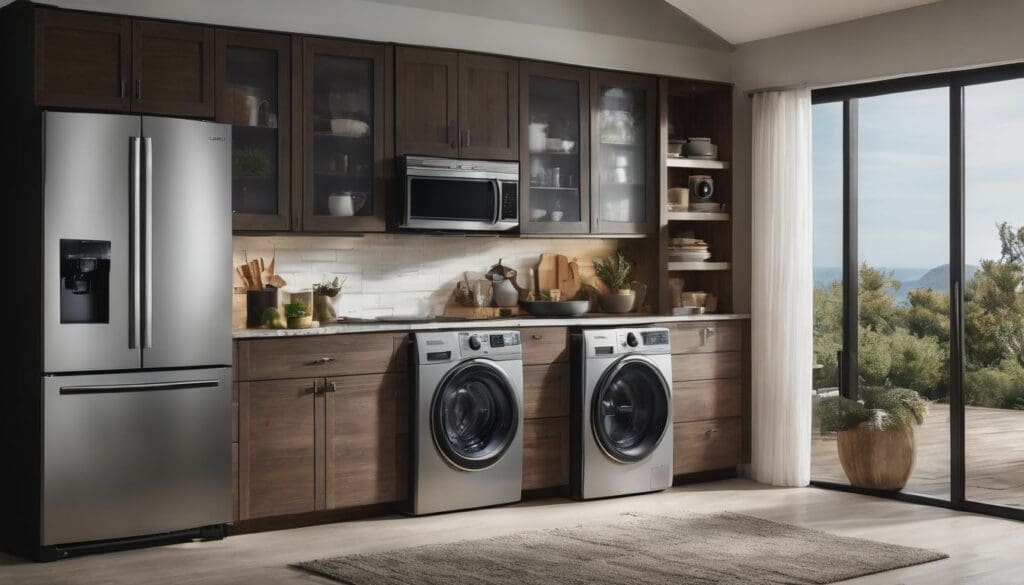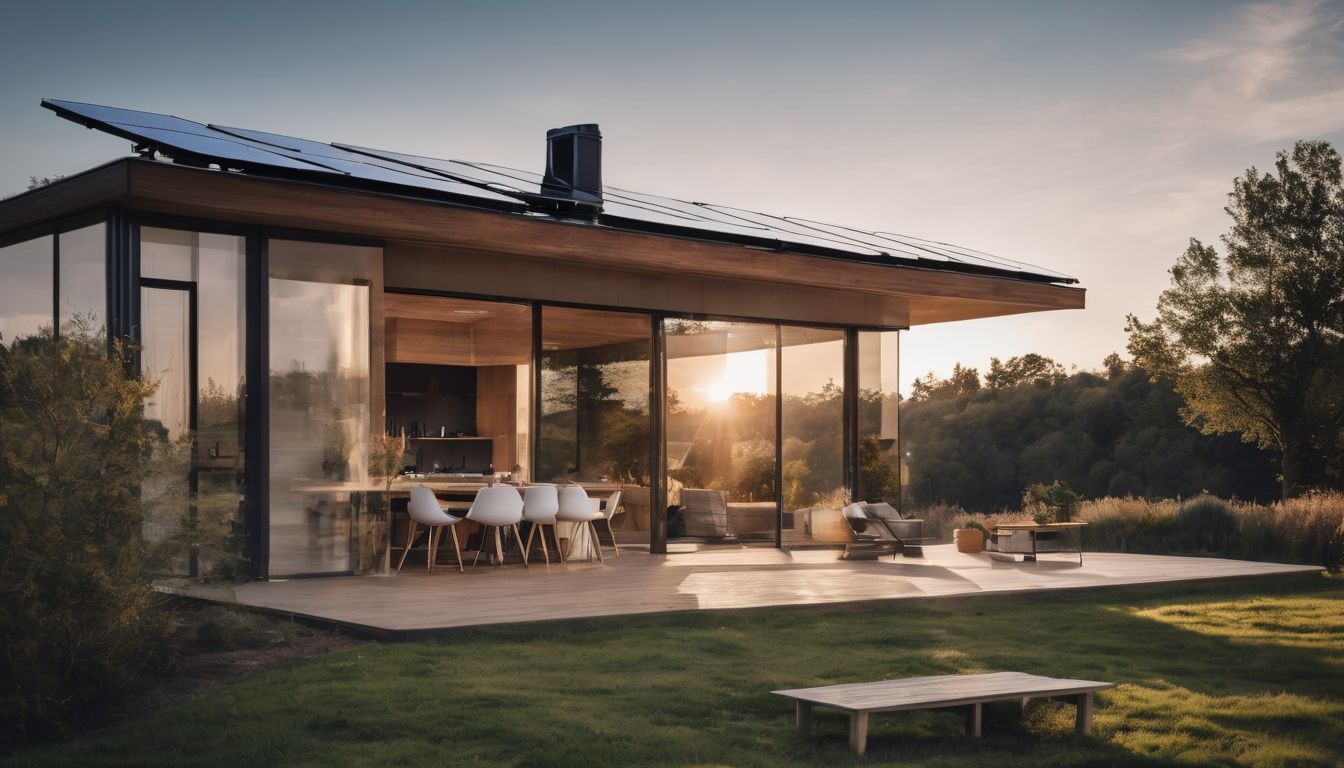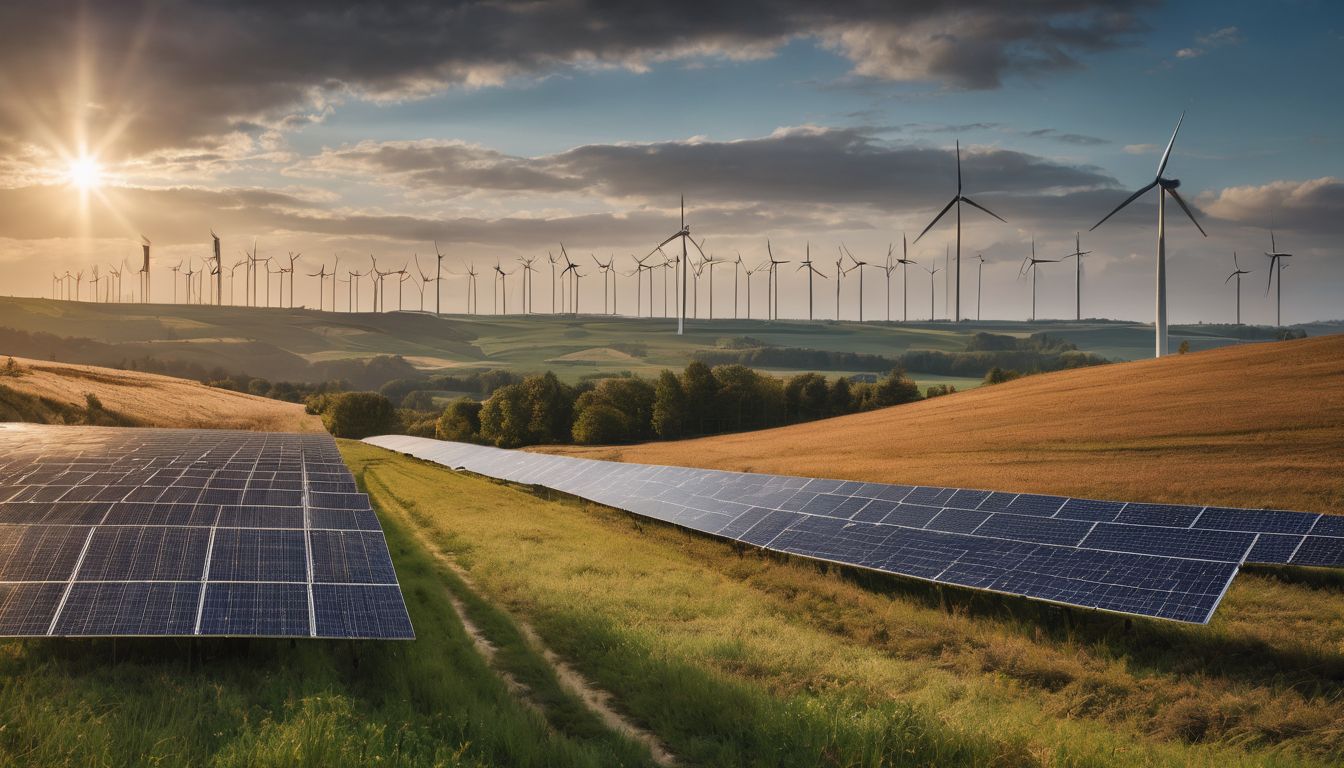Are your electricity bills shooting up month by month? Surprisingly, the electronics we use daily could be the hidden culprits. This guide will provide you with practical tips to select energy-efficient electronics that save money and are kinder to the planet.
Keep reading – it’s easier than you think!
Key Takeaways
- Choosing electronics with high energy efficiency ratings can significantly lower your electricity bills and reduce environmental impact.
- Look for energy – efficient labels such as Energy Star to compare and select the best appliances that suit your needs while conserving power.
- Opt for smart appliances with features like remote operation and energy – saving modes to better control and reduce your home’s energy usage.
- Unplugging devices when not in use and using smart power strips are easy ways to cut down on unnecessary energy consumption.
- When purchasing new electronics, consider the total cost of ownership, which includes both purchase price and long-term running costs, to ensure savings over time.
Understanding Energy-Efficiency
Energy efficiency refers to using less energy to provide the same service, reducing energy consumption while delivering the same level of performance. It is important because it helps lower energy bills, reduce greenhouse gas emissions, and conserve natural resources.
What is energy efficiency?
Energy efficiency means using less power to perform the same tasks – essentially, doing more with less. It’s about electronics that need fewer watts of electricity yet deliver the same level of performance or service you’ve come to expect.
Energy-efficient devices not only save money on bills but also reduce energy consumption and help in energy conservation which is critical for a sustainable future.
Choosing appliances that excel in energy efficiency can have a big impact on your carbon footprint and contribute positively towards environmental conservation. Next, we’ll explore why this matters significantly for both your wallet and our planet.
Why is it important?
Energy-efficient electronics are crucial for reducing energy consumption and minimising environmental impact. By choosing energy-efficient appliances, you can lower your electricity bills and contribute to a greener planet.
This shift towards eco-friendly electronics not only benefits the environment but also promotes sustainability in everyday living. Making informed choices about energy-efficient products helps to conserve valuable resources and reduce the carbon footprint associated with household consumption.
Embracing these technologies is an essential step towards creating a more sustainable future, ensuring that we leave behind a healthier planet for future generations.
How to Choose Energy-Efficient Electronics
Consider the total cost of ownership when purchasing electronics, taking into account both the initial purchase price and ongoing energy costs. Look for energy ratings and labels to compare efficiency levels between products.
Select the right-sized appliances for your needs to avoid unnecessary energy consumption. Find eco-friendly options that are designed to minimise environmental impact, and consider smart appliances that can help you save energy through automation and remote controls.
Consider total cost
When buying energy-efficient electronics, it is essential to consider the total cost of ownership. This includes not only the initial purchase price but also the long-term costs such as energy consumption and maintenance.
By choosing appliances with higher energy ratings and lower power consumption, you can save money in the long run while reducing your environmental impact. Look for products that are not only eco-friendly but also cost-effective over time.
Selecting the right-sized appliances for your needs is another crucial factor when considering total cost. Buying a larger appliance than necessary will result in higher energy usage and increased expenses over time.
Look for energy ratings and labels
When selecting new electronics, always look for energy ratings and labels to ensure you are choosing the most efficient options. These labels provide valuable information on energy consumption, making it easier to compare different products.
Energy Star and other rating systems help identify sustainable and eco-conscious choices that align with your environmental values. By actively seeking out these indicators, you can make informed decisions that contribute to energy conservation in your home.
Prioritise appliances displaying clear energy efficiency ratings as they are essential for reducing power consumption whilst maintaining optimal functionality within the home environment.
Select the right-sized appliances
When choosing appliances, consider your actual needs and usage to select the right size for your home. Look for appliances that fit your space requirements and energy usage, ensuring they are not too large or small for your household.
This will help avoid unnecessary energy consumption and wastage, supporting a more eco-friendly approach to appliance use.
Find eco-friendly options for use
When selecting energy-efficient electronics, opt for products with eco-friendly features such as low-power consumption and sustainable technology. Look for devices that are designed to minimise environmental impact while still providing efficient performance.
Consider energy-saving appliances that align with your conservation goals and contribute to a greener household.
One way to ensure you’re choosing eco-friendly options is by looking for energy-efficient labels on the product packaging or researching green technology products in line with your values.
By prioritising eco-conscious appliances and devices, you can make a positive impact on both the environment and your energy bills.
Consider smart appliances
When considering smart appliances, look for features such as energy-saving modes, remote operation, and scheduling capabilities to maximise efficiency. These devices can help you monitor and manage energy usage in real time, reducing wastage and overall consumption.
Smart appliances also offer the convenience of adjusting settings from your smartphone or tablet, giving you greater control over how and when energy is used.
Specific Guidelines for Energy-Efficient Electronic Purchases
Learn about the specific guidelines for buying energy-efficient electronics such as refrigerators, dishwashers, ovens/cookers, kettles/water boilers, and washing machines. Each of these appliances has unique energy-saving features to consider before making a purchase.
Refrigerators
When shopping for refrigerators, look for models with high energy efficiency ratings. Consider the size of the fridge to match your household’s needs as larger units consume more power.
Eco-friendly options including those with smart technology can further reduce energy usage. Evaluate the total cost of ownership by factoring in not just the purchase price but also the long-term energy consumption.
Refrigerators play a significant role in home energy consumption. Choosing an energy-efficient model can result in substantial savings over time and is an important step towards reducing our environmental impact while supporting conservation efforts.
Dishwashers
When purchasing a new dishwasher, look for models with the Energy Guide label that indicates energy consumption. Choose a dishwasher with an eco-friendly option for use and consider smart appliances to save on water and electricity.
Selecting the right-sized appliance will prevent excessive energy usage, contributing to your efforts in conserving resources. Additionally, opting for an energy-efficient dishwasher reduces power consumption and supports sustainable living in your household.
Choose dishwashers that have a high-energy efficiency rating to ensure lower power consumption over time. Look for low-power consumption electronics as part of your environmentally conscious effort at home, which will support conservation and environmental sustainability in the long run.
Ovens/cookers
When purchasing ovens or cookers, look for energy-efficient models with high energy ratings and clear eco-friendly labels. Consider the right size appliance that suits your cooking needs without unnecessary waste.
Opt for smart appliances that offer energy-saving features to reduce power consumption.
Choosing an oven or cooker with a focus on energy efficiency not only saves you money in the long run but also contributes to environmental conservation. Sustainable electronics are increasingly available, offering environmentally conscious individuals a range of options to support their commitment to energy conservation.
Kettles/Water boilers
When buying kettles or water boilers, look for energy-efficient models with high insulation to keep water hot. Choose devices with automatic shut-off features and adjustable temperature settings to save energy.
Opt for eco-friendly materials and avoid plastic components that may leach chemicals into the water. Consider electric kettles over hob ones as they are more energy efficient. Prioritise kettles and boilers with a quick boil feature to reduce overall energy consumption.
Moving on to “Washing Machines,” let’s explore how you can choose an environmentally friendly and energy-efficient option for your laundry needs.
Washing machines
When buying a washing machine, look for the energy label to identify its efficiency. Consider front-loading models as they are generally more energy-efficient than top-loading ones.
Opt for a machine with variable temperature settings and load sensors to save energy and water. Select a model with a high spin speed to reduce drying time, saving both electricity and time.
For environmentally conscious individuals seeking conservation, choosing an energy-efficient washing machine can provide long-term savings on utility bills while reducing environmental impact.
Additional Tips for Saving Energy in the Home
Unplug unused electronics to reduce energy consumption. Use energy-efficient light bulbs and invest in smart power strips for further energy savings in the home.
Unplug unused electronics
When electronics are not in use, unplugging them can save energy and reduce your electricity bill. Leaving devices like chargers, TVs, and computers plugged in when not in use still consumes energy known as standby power.
Unplugging these items can make a noticeable difference in your overall energy consumption and contribute to a more eco-friendly home.
Remember to unplug unused electronics, such as phone chargers, gaming consoles, and kitchen appliances when they’re not being used. This simple habit can lead to significant energy savings over time while contributing to a greener environment for all.
Use energy-efficient light bulbs
Switching to energy-efficient light bulbs is a simple and effective way to reduce your home’s energy consumption. Look for LED or CFL bulbs, which use less power and last longer than traditional incandescent bulbs.
These bulbs also produce less heat, making them safer and more cost-effective in the long run.
When replacing your old light bulbs, pay attention to the brightness level and colour temperature of the new ones. LED bulbs offer a wide range of options to suit different needs, from warm white for cosy spaces to cool white for task-oriented areas.
Purchase smart power strips
When buying power strips, look for smart options that can detect when devices are not in use and automatically cut off power to them. These power strips help reduce electricity wastage caused by devices on standby mode or plugged in unnecessarily.
Smart power strips also come with built-in surge protectors, safeguarding your electronics from voltage spikes, enhancing their lifespan.
Smart power strips enable you to better manage energy consumption by scheduling when connected devices should be powered on and off. With features like remote control access via mobile apps, you can easily monitor and control energy usage even when away from home.
Conclusion
Make informed choices when buying energy-efficient electronics.
Consider the total cost, look for energy ratings, and opt for eco-friendly options.
Remember to unplug unused electronics and use smart power strips to save energy.
Now you have the knowledge to make environmentally friendly purchasing decisions!
FAQs
1. What should I look for when buying energy-efficient electronics?
When shopping for energy-efficient electronics, search for products listed as energysaving appliances or lowpower consumption electronics to reduce your home’s energy use.
2. Why are ecofriendly appliances important?
Ecofriendly appliances are key because they help cut down on energy use and can save you money on power bills while being kinder to the environment.
3. Can you provide a list of energyefficient household items?
A guide to buying energy-efficient electronics would include an array of devices such as powerefficient gadgets, ecoconscious appliances, and environmentalfriendly gadgets that conserve energy.
4. How do I know if an electronic device is energysaving?
Check if the electronic device features energysaving labels or certifications which indicate it’s designed with energyefficient technology that consumes less electricity.
5. Are there specific brands known for offering ecofriendly electronics?
Yes, many manufacturers now focus on creating ecofriendly devices; hence, look up brands that have a reputation for providing a selection of ecofriendly electronics alongside their other products.





